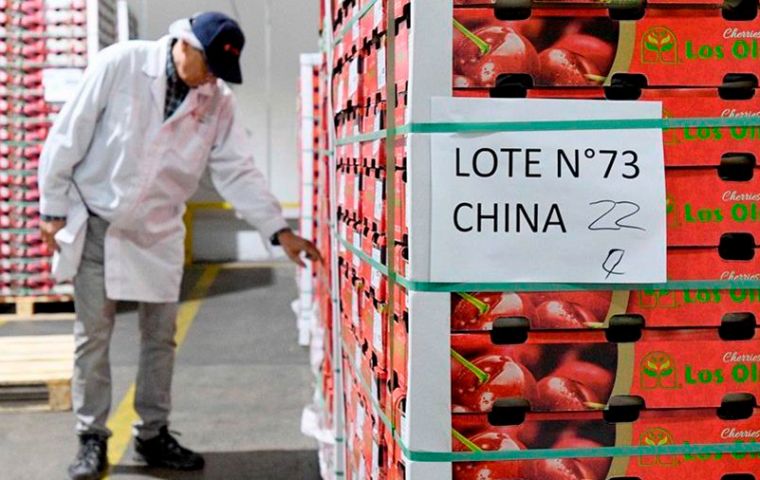MercoPress. South Atlantic News Agency
Chile expects a larger cherry harvest this season and increasing exports 20% is the goal
 Harvest is promising but climate and port logistics are essential to ensure Chile can effectively increase exports of cherries, mainly to China the leading market
Harvest is promising but climate and port logistics are essential to ensure Chile can effectively increase exports of cherries, mainly to China the leading market Spring and summer are coming to the southern hemisphere and the Chilean Fruit Exporters Association, Asoex, anticipated that with the new season, the country can comfortably target a 20% target increase for Chilean cherries, (November to February).
ASOEX Executive Director, Claudia Soler said that although most encouraging, the projection still depends on a variety of factors, climate and logistics conditions, as well as the continued diversification of domestic and international ports handling fruit produce.
“There will be several challenges ahead in terms of increased production. We worked with stakeholders, shipping companies, ports, and cargo operators to collectively diversify the same ports, ensuring there are no bottlenecks in reaching our destinations,” Soler said in an interview with PortalPortuario.
“It’s likely that we will have to diversify both Chilean and overseas ports and ensure an adequate number of vessels are available for transporting the cargo. Port development and technology will need to align with the volumes we have. Greater development should occur for the ports of Valparaíso and San Antonio,” she added.
Soler, who is closely associated with the group representing fresh fruit producing-exporting companies, emphasized China as the primary customer and underscored that Chile‘s port complexes “must align” with the goal of increasing cherry export shipments.
In light of this, and given the characteristics of cherries, Soler stated, “We need the processes to be as efficient as possible. With the expected increase in production, we will need to continue collaborating with ports and stakeholders. The goal is to ensure that cherries are not harmed or outdated.”
Finally, it’s worth noting that the President of Asoex highlighted the need to conclude the expansion projects for the ports of Valparaíso and San Antonio. According to the director of the Blueberry Committee at Asoex, who also weighed in, the advancements in port infrastructure in Peru, such as in Chancay, in association with Chinese companies, would diminish Chile’s competitiveness in terms of positioning fruit produce in international markets.




Top Comments
Disclaimer & comment rulesCommenting for this story is now closed.
If you have a Facebook account, become a fan and comment on our Facebook Page!